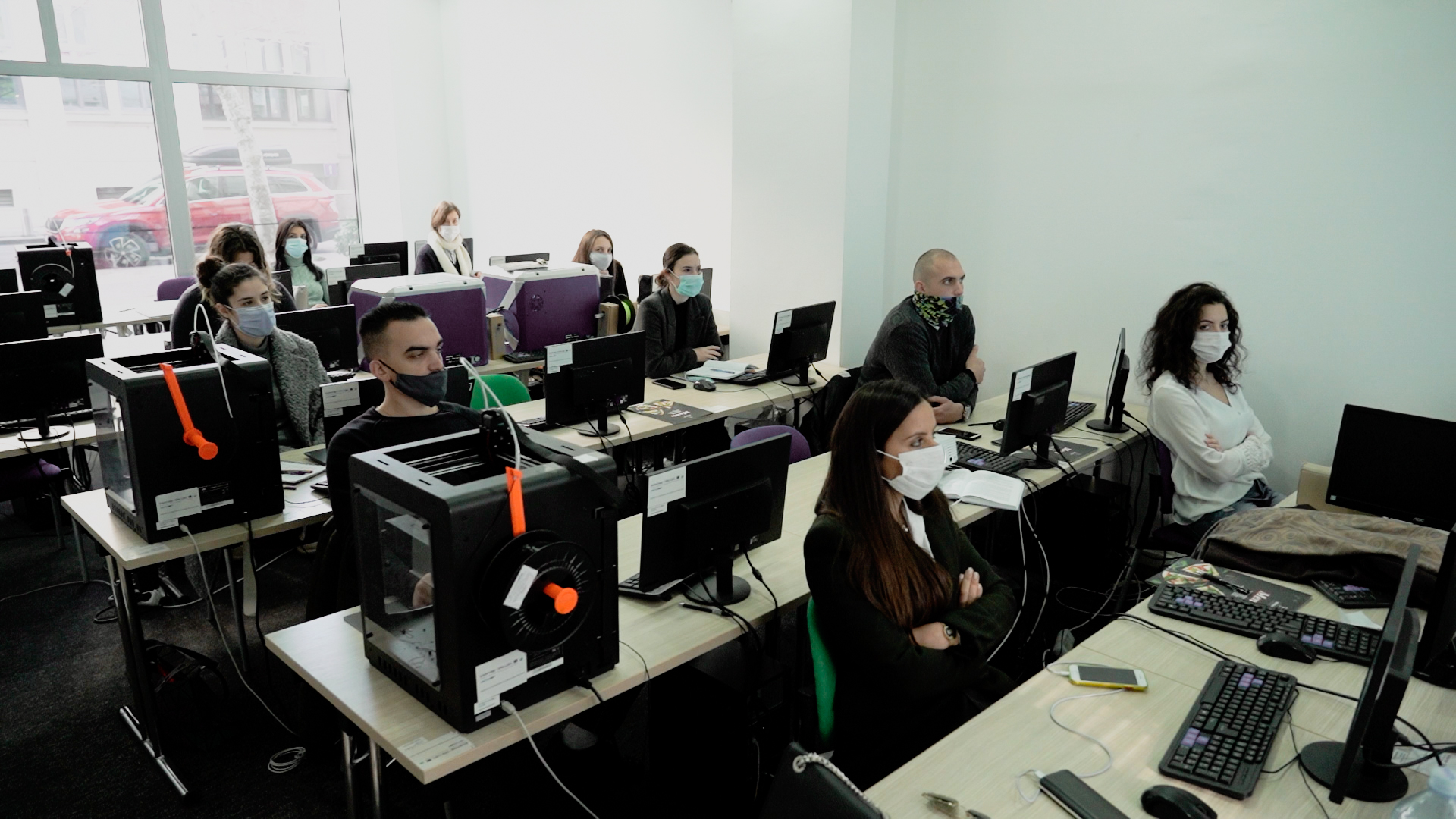
Global and national virus containment measures, from social distancing to business shutdowns, have reduced household incomes and consumption, triggering an economic crisis all over the world. The Western Balkans are no exception in this regard: the World Bank’s Western Balkans Regular Economic Report: Fall 2020, predicted that economic activity in the region will contract by 4.8 per cent overall in 2020, causing a more severe recession than the most recent global financial crisis.
At the same time, the pandemic has also opened up new opportunities. A brief on e-commerce in the time of COVID-19 published by the Organisation for Economic Cooperation and Development identifies how the COVID-19 crisis has accelerated an expansion of e-commerce towards new firms, customers and types of products.
A promising initiative that could turn into a big business
Miloš Laković, 27, is a high school teacher and part-time entrepreneur from Montenegro. He is one of the visionaries who saw the pandemic crisis as an opportunity. Miloš had a business idea for an online platform that would connect providers and users of services. The idea was there for some time, but the pandemic made him think more seriously about it and take the initiative to launch it. “As a schoolteacher, I know that many of my colleagues provide private courses after working hours. The situation imposed by the pandemic made me think ‘why not promote and provide these services online?’ and I decided to develop this idea further,” Miloš says.
“As a schoolteacher, I know that many of my colleagues provide private courses after working hours. The situation imposed by the pandemic made me think ‘why not promote and provide these services online”
As time went on, Miloš and his team came up with more types of services – beyond private teaching – that could be marketed through the platform, from art sales to cosmetics. They are now at the final stage of their market research and will soon start work on the development of the platform.
Miloš explains that a lot of the credit for further developing this initiative goes to the support that he received from participating in the workshops provided by the EU-funded project, Self-Employment and Social Entrepreneurship for Youth. “By participating in these workshops, we managed to develop the idea further and take it to a level of real entrepreneurial initiative,” he says.

“By participating in these workshops, we managed to develop the idea further and take it to a level of real entrepreneurial initiative”
I2 Space – a place of innovation
The purpose of the project is to improve access to the labour market for young people in Montenegro and Kosovo. The core of the project idea is the establishment of physical environments in a format known as Hackerspace –equipping these spaces with the necessary tools, and providing training and mentorship for young people on social innovation and digital technology. The project established two such spaces: one in Peja/Peć in Kosovo and another in Podgorica, Montenegro. The spaces were named I2 Space.
During the two years of the project, more than 200 young people have benefited from I2 Space activities both in Peja/Peć and Podgorica. A number of them have already started to earn through employment or by providing freelance services. The project provided courses and mentorship programmes on coding and web customisation, 3D Printing and electronics, digital marketing, graphic design and photography.
Božina Stešević is a project manager at the civil society organisation Association for Democratic Prosperity – Zid, the lead partner of the project from Montenegro. He says that one of the main achievements of the project is the conception and effective functioning of the I2 Space community itself. “There is this inner circle of I2 Space users who cooperate among themselves and do this in a common physical space. Then there is the circle of all young people who have participated in the training; and last, but not least, there is a wider circle which connects young people from both sides of the border who are already cooperating in exchanging ideas and business perspectives and also on breaking down prejudices.”
One-to-one mentorship was one of the crucial components of the project. As part of this, the participants were expected to develop innovative business start-up prototype ideas that have the potential to develop further. To date, applicants of the program have prototyped 23 start-up ideas, including the brainchild of Miloš.
The Self-Employment and Social Entrepreneurship for Youth project is implemented within the IPA 2014-2020 Cross-Border Cooperation Program Montenegro – Kosovo, funded by the European Union. The project is being implemented by the civil society organisations Association for Democratic Prosperity – Zid, Lens, Liberal Democrat Centre and Creative Skills’ Center. The project started back in January 2019, and it is expected to end at the beginning of 2021.
Photo credits: Fitim Shala
At the same time, the pandemic has also opened up new opportunities. A brief on e-commerce in the time of COVID-19 published by the Organisation for Economic Cooperation and Development identifies how the COVID-19 crisis has accelerated an expansion of e-commerce towards new firms, customers and types of products.
A promising initiative that could turn into a big business
Miloš Laković, 27, is a high school teacher and part-time entrepreneur from Montenegro. He is one of the visionaries who saw the pandemic crisis as an opportunity. Miloš had a business idea for an online platform that would connect providers and users of services. The idea was there for some time, but the pandemic made him think more seriously about it and take the initiative to launch it. “As a schoolteacher, I know that many of my colleagues provide private courses after working hours. The situation imposed by the pandemic made me think ‘why not promote and provide these services online?’ and I decided to develop this idea further,” Miloš says.
As time went on, Miloš and his team came up with more types of services – beyond private teaching – that could be marketed through the platform, from art sales to cosmetics. They are now at the final stage of their market research and will soon start work on the development of the platform.
Miloš explains that a lot of the credit for further developing this initiative goes to the support that he received from participating in the workshops provided by the EU-funded project, Self-Employment and Social Entrepreneurship for Youth. “By participating in these workshops, we managed to develop the idea further and take it to a level of real entrepreneurial initiative,” he says.

I2 Space – a place of innovation
The purpose of the project is to improve access to the labour market for young people in Montenegro and Kosovo. The core of the project idea is the establishment of physical environments in a format known as Hackerspace –equipping these spaces with the necessary tools, and providing training and mentorship for young people on social innovation and digital technology. The project established two such spaces: one in Peja/Peć in Kosovo and another in Podgorica, Montenegro. The spaces were named I2 Space.
During the two years of the project, more than 200 young people have benefited from I2 Space activities both in Peja/Peć and Podgorica. A number of them have already started to earn through employment or by providing freelance services. The project provided courses and mentorship programmes on coding and web customisation, 3D Printing and electronics, digital marketing, graphic design and photography.
Božina Stešević is a project manager at the civil society organisation Association for Democratic Prosperity – Zid, the lead partner of the project from Montenegro. He says that one of the main achievements of the project is the conception and effective functioning of the I2 Space community itself. “There is this inner circle of I2 Space users who cooperate among themselves and do this in a common physical space. Then there is the circle of all young people who have participated in the training; and last, but not least, there is a wider circle which connects young people from both sides of the border who are already cooperating in exchanging ideas and business perspectives and also on breaking down prejudices.”
One-to-one mentorship was one of the crucial components of the project. As part of this, the participants were expected to develop innovative business start-up prototype ideas that have the potential to develop further. To date, applicants of the program have prototyped 23 start-up ideas, including the brainchild of Miloš.
The Self-Employment and Social Entrepreneurship for Youth project is implemented within the IPA 2014-2020 Cross-Border Cooperation Program Montenegro – Kosovo, funded by the European Union. The project is being implemented by the civil society organisations Association for Democratic Prosperity – Zid, Lens, Liberal Democrat Centre and Creative Skills’ Center. The project started back in January 2019, and it is expected to end at the beginning of 2021.
Photo credits: Fitim Shala
Please wait while your video is being uploaded...
Don't close this window!